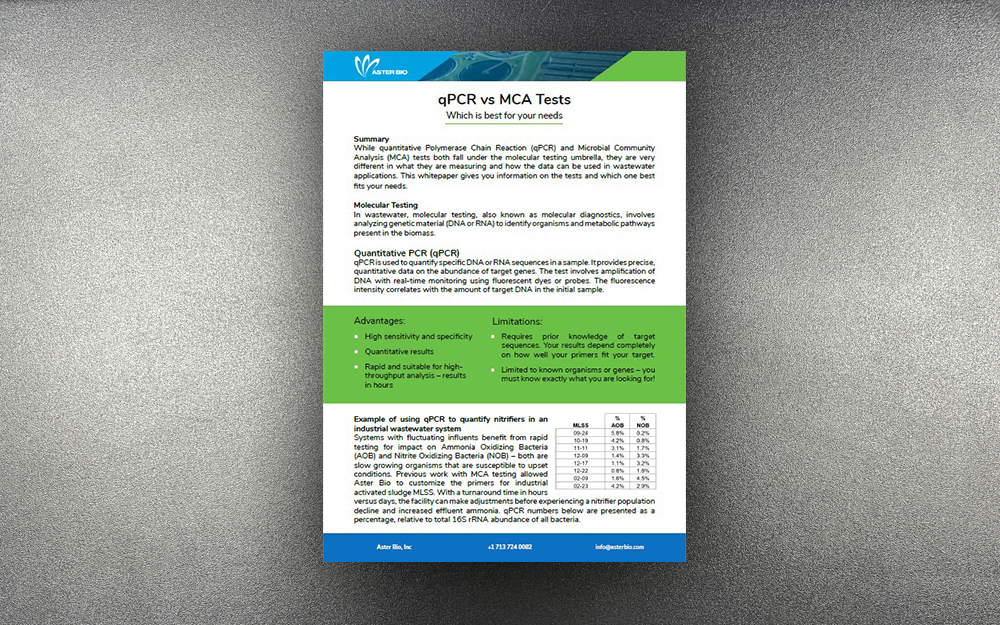In wastewater treatment and environmental monitoring, molecular testing technologies have revolutionized the way we analyze microbial populations and identify specific contaminants. But what’s the difference? qPCR vs MCA Tests…
Among these technologies, quantitative Polymerase Chain Reaction (qPCR) and Microbial Community Analysis (MCA) stand out as two of the most widely used methods. Although both fall under the broad umbrella of molecular testing, they serve distinct purposes and offer unique insights depending on the application.
This article is a brief overview of qPCR and MCA which should introduce you to a deeper understanding of qPCR and MCA, highlighting the differences in what they measure, how they function, and the types of data they generate. It also discusses practical applications in wastewater management and offers guidance on selecting the most appropriate test based on specific operational objectives.
What is qPCR?
qPCR is a precise and highly sensitive molecular tool that quantifies the presence of specific target DNA sequences. In the context of wastewater treatment, qPCR is primarily used to detect and quantify the DNA of specific microorganisms, pathogens, or functional genes of interest. This targeted approach allows for rapid identification of harmful pathogens or operationally critical organisms, such as nitrifiers or phosphate-accumulating organisms, which can influence treatment processes.
- Key Benefits: qPCR is known for its high sensitivity, speed, and specificity, making it ideal for tracking specific microbial populations or pathogen outbreaks.
- Limitations: Since qPCR focuses on specific DNA sequences, it may not provide a complete picture of the entire microbial community or identify unexpected microbial shifts.
What is Microbial Community Analysis (MCA)?
On the other hand, Microbial Community Analysis (MCA) provides a broader, more holistic view of the entire microbial ecosystem present in a sample. MCA uses 16s next-generation sequencing (NGS) (a subset of metagenomics) to analyze the diversity and relative abundance of all microbial species, offering insights into the structure, dynamics, and functional potential of microbial communities in wastewater systems.
- Key Benefits: MCA delivers a comprehensive overview of the microbial ecosystem, capturing information on both dominant and rare microbial species. It is particularly useful when studying the overall health of microbial communities, identifying shifts in microbial populations over time, or troubleshooting unexplained changes in system performance.
- Limitations: MCA is typically more complex, time-consuming, and may require specialized bioinformatics expertise for data interpretation.
Applications in Wastewater Management
Both qPCR and MCA are invaluable tools in wastewater applications, but each has its unique strengths depending on the operational goals.
- For targeted monitoring and compliance: If you’re focused on detecting specific pathogens or functional genes critical to your process, qPCR is the go-to tool. It can provide fast and reliable results, ensuring that necessary action is taken quickly.
- For system optimization and troubleshooting: When you need a broader understanding of microbial dynamics or want to investigate the overall health and functionality of your treatment system, MCA offers the detailed insights needed to inform long-term operational decisions.
Choosing the Right Test for Your Needs: qPCR vs MCA Tests
Selecting between qPCR and MCA depends largely on your operational goals and the nature of your wastewater system. If you require precise, fast results for specific microorganisms, qPCR offers unmatched specificity and speed. Conversely, if you are troubleshooting system performance or seeking to understand the broader microbial environment, MCA provides the in-depth community analysis necessary for a holistic understanding of system dynamics.
The Takeaway
Molecular testing technologies like qPCR and MCA are powerful tools for managing and optimizing wastewater treatment processes. By understanding the differences in their capabilities, you can choose the right test to meet your specific needs—whether it’s rapid pathogen detection or comprehensive microbial community analysis. This whitepaper serves as a guide to help you make informed decisions about which molecular testing method will best support your wastewater management goals.
Feel free to download the full whitepaper and reach out to a Biomass Expert with questions, or to get your sample tested right away.


